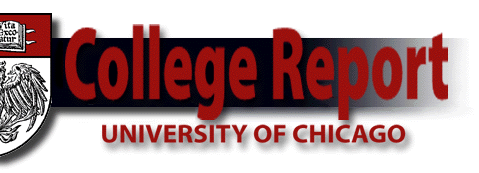 |

Overachieving pays
Not content with three Rhodes scholars, the University of Chicago
is churning out still more scholarship winners. Catherine Potter
has been awarded the Truman and Chris Calderone has received the
Churchill, while Sarah Bagby, Matthew Gealy, and Andrew Tolland
have received Goldwaters.
One of 75 American college students to be recognized this year
by the Harry S. Truman Scholarship Foundation, Potter will use her
$30,000 award to pursue a master’s degree in public policy,
focusing on gender equality in the workplace, in education, and
at home. “What is great about the Truman foundation is that
it links you to people who are serious and passionate about their
issues,” says the third-year English concentrator. “The
foundation is interested in how individuals are going to exact social
change.”
Last year, as co-director of Student Teachers, a group that provides
after-school mentoring programs for local youth, Potter expanded
the participants from one to three elementary schools, and from
50 to 100 students. This past year, she has coordinated volunteers
for Student Teachers; tutored through the Washington Park Youth
Program; sung for Men in Drag, an a cappella student group; danced
in Jazz Alive!, a dance troupe she founded; and written for the
Maroon.
Earlier this year, the College received the Truman Foundation Honor
Institution Award for the school’s recognition and encouragement
of excellent candidates for the Truman’s program.
Among other recognized scholars, fourth-year chemistry concentrator
Calderone became one of 11 students in the country to receive an
academic scholarship from the Winston Churchill Foundation of the
United States. Calderone will use the $25,000 award for a year of
graduate study in science and technology at Churchill College at
the University of Cambridge.
Calderone speculates that he won the award because of his research
on molecular recognition, or “how molecules talk to each other”—work
done over the past two years with chemistry professor David Lynn.
At Churchill, Calderone plans to further explore how molecules recognize
one another and use energy to transfer information.
Students recognized by the Barry M. Goldwater Scholarship and
Excellence in Education Program receive funds toward the costs of
tuition, fees, books, and room and board—up to a maximum of
$7,500 for each year for the remainder of their college careers.
Bagby, a third-year biochemistry concentrator, studies protein
crystallography in the lab of Phoebe Rice, an assistant professor
in biochemistry and molecular biology. She hopes to research signal
transduction. “Cells respond to signals, like hormones, from
outside of the cell in intricate and elegant ways,” she explains.
In her Goldwater application, Bagby proposed a method for identifying
new G proteins. “The method I suggested,” she says, “is
probably pretty impractical, but it’s interesting to think
about—and parts of it might give rise to some good research.”
Bagby competes on the College Bowl team and plays alto saxophone
in the Chicago Wind Ensemble.
Gealy, a second-year mathematics concentrator, also received a
Goldwater. Last summer, Gealy researched finite fields in linear
algebra at the U.S. Department of Defense. This summer, he plans
to explore number games, magic squares, and Latin squares while
working on point-set topology in Tourier analysis with mathematics
professor Paul Sally Jr. Outside of his interests in math, Gealy
juggles, reads, plays the violin, and is also on the College Bowl
team.
The third Goldwater winner, Tolland, has researched, with David
Oxtoby, the dean of physical sciences, the nucleation processes
that occur when cells divide. “A. J. is a very creative and
original physics student who has already made contributions to two
very different fields of physics: high energy and condensed matter
physics,” says Oxtoby of the second-year physics concentrator.
Tolland also finds time to participate in the Ryerson Astronomical
Society and the Gymnastics Club.—J.P.
|

